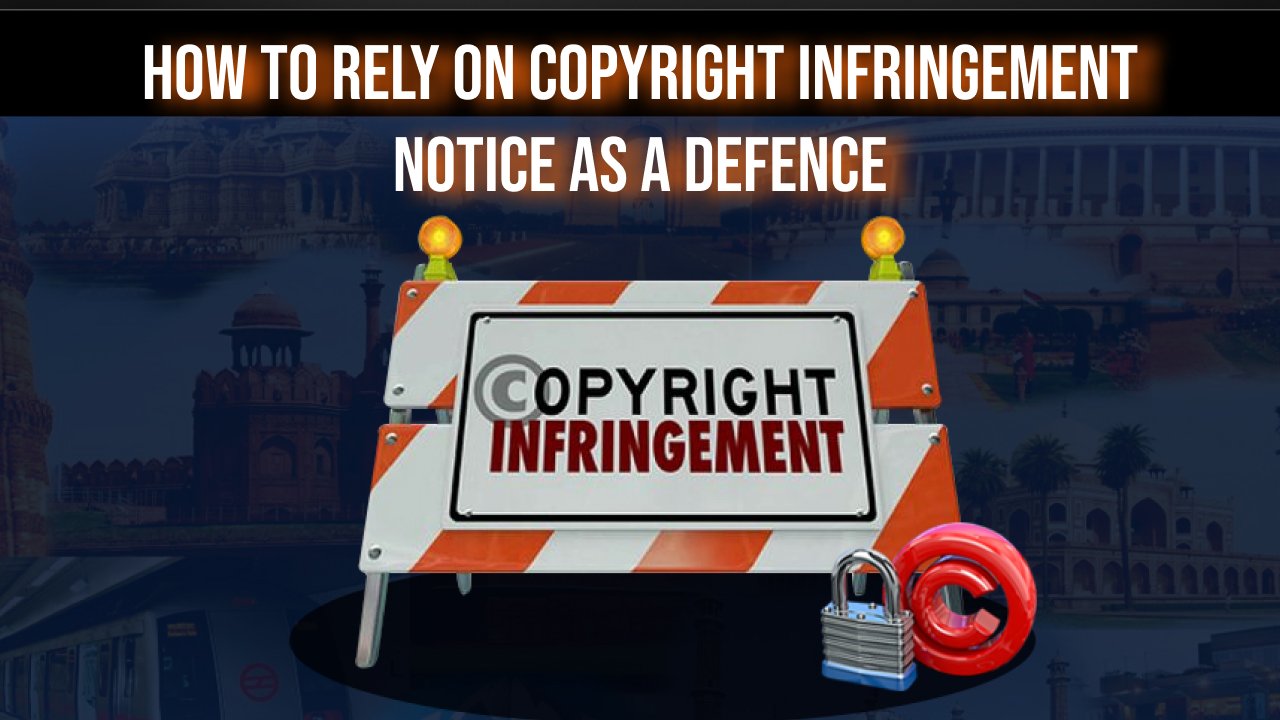How to rely on copyright infringement notices as a defence?
This article defines copyright and its infringement, how the infringement is done and the infringer gets the notice from the original owner of the work when the infringement comes to his knowledge. Also, some of the major points were mentioned in this article which a person will use as a defence in the reply of the notice.

Copyright infringement occurs when someone uses a copyrighted work without the permission of the copyright owner or in a way that exceeds the scope of any license or agreement that may be in place. Examples of copyright infringement include reproducing, distributing, displaying, or performing a copyrighted work without authorization, or creating a derivative work based on a copyrighted work without permission.
When a copyright owner becomes aware of an infringement, they may choose to send a copyright infringement notice to the alleged infringer. The notice typically provides information about the infringing activity, such as the title and author of the work, the location and date of the infringement, and evidence that the work is protected by copyright. The notice will demand that the infringer stop using the copyrighted work and may request compensation for damages caused.
The purpose of a copyright infringement notice is to allow the alleged infringer to stop using the copyrighted work before the copyright owner takes legal action against them. In some cases, the copyright owner may be willing to negotiate a settlement or license agreement with the alleged infringer instead of going to court.
It is important to take a copyright infringement notice seriously and to respond promptly. Ignoring the notice or failing to take appropriate action can lead to legal action being taken against you, which can result in fines, damages, and legal fees. If you receive a copyright infringement notice, it is a good idea to seek legal advice to understand your options and determine the best course of action.
To rely on a copyright infringement, notice as a defence, you need to take certain steps:
- Verify the authenticity of the notice: Before taking any action, you need to make sure that the copyright infringement notice is genuine. Check the email address, phone number, or mailing address of the sender to make sure it matches the contact information of the copyright owner or their authorized representative. Be aware that some scammers may send fake notices to extort money or gain access to your personal information. If you're unsure whether the notice is legitimate, contact the copyright owner or their representative directly to verify it.
- Determine if you have actually infringed the copyright: If the notice is genuine, review your use of the copyrighted work to determine if you have infringed the copyright. In general, copyright infringement occurs when you use someone else's work without their permission in a way that is not allowed by law, such as reproducing, distributing, displaying, or performing the work. If you have indeed infringed the copyright, it may be best to negotiate with the copyright owner to resolve the issue.
- Check for fair use: If you believe that your use of the copyrighted work is allowed under the doctrine of fair use, you may be able to defend yourself against the copyright infringement claim. Fair use is a legal exception to copyright that allows the use of copyrighted material for certain purposes, such as criticism, commentary, news reporting, teaching, scholarship, or research. The four factors that courts consider when determining fair use are:
The purpose and character of the use, including whether it is commercial or non-commercial, transformative or non-transformative, and whether it adds something new or is merely a copy of the original work.
The nature of the copyrighted work, including whether it is factual or creative, published or unpublished, and how much of the work was used.
When using a copyrighted work, it's important to consider both the amount and significance of the portion used about the work as a whole. Additionally, you should also consider the potential impact of your use on the market value of the work. If you believe that your use of copyrighted work is fair, it's recommended that you document your analysis and be prepared to defend your position.
- Seek legal advice: If you are unsure about how to proceed or if the copyright owner has initiated legal action against you, it is recommended that you consult a qualified attorney who specializes in copyright law. They can help you understand your rights and obligations, assess your legal options, and represent you in court if necessary. An experienced copyright lawyer can also help you negotiate a settlement or license agreement with the copyright owner to resolve the issue.
Conclusion:
In conclusion, copyright infringement is a serious matter that can result in legal consequences, including fines, damages, and legal fees. If you receive a copyright infringement notice, it is important to take it seriously, verify its authenticity, and determine whether you have infringed the copyright or if your use of the copyrighted work falls under the doctrine of fair use. Seeking legal advice is recommended to help you understand your rights and obligations, assess your legal options, and represent you in court if necessary. By understanding the basics of copyright law and taking appropriate action, you can protect yourself from potential legal trouble and help promote a culture of respect for intellectual property rights.












